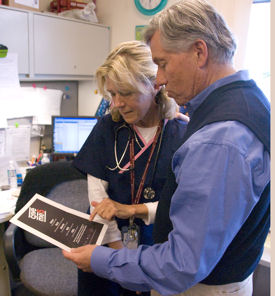John McCain touts his plan for the U.S. health care system
CME offerings and maintenance of certification.
Despite the importance of health care in the 2008 presidential campaign, relatively little attention has been paid to the plans that the Republican nominee Sen. John McCain has proposed for the U.S. health care system.
Part of that is because Sen. McCain himself has spent less time talking about the issue than his Democratic opponents. His reticence makes sense, given that Republican voters rank health care as a less important issue (fourth) than do Democrats (second), a Kaiser Foundation poll found. But Sen. McCain has released some proposals to reform health care, and although his plans are not fully fleshed out, they represent a dramatic change from both the current status quo and Democratic proposals.
Unlike the Democrats, cost, rather than access, is the focus. “The problem is not that most Americans lack adequate health insurance,” Sen. McCain told an audience in Des Moines, Iowa. “The biggest problem with the American health care system is that it costs too much.”

The centerpiece of his plan to tackle cost is to change the tax code, which would eliminate the incentives for employer-sponsored health coverage and offer individuals a $2,500 tax credit ($5,000 per family) for purchasing their own insurance. Under his plan, which also encourages health savings accounts and cost transparency, patients will have substantially more responsibility for making their own health care and coverage determinations, and would be less likely to choose the most expensive and often unnecessary options, he said in the same speech.
To foster nationwide competition and thereby reduce cost, Sen. McCain also proposes eliminating state-by-state divisions of insurance marketing and physician practice.
Although states would lose some control over insurance regulation and medical licensing, they would take on the new responsibility of finding coverage for high-risk, high-cost patients. States should develop methods for providing additional assistance to families who face unusually high premiums, Sen. McCain said. “The federal government can help fund this effort, but in exchange states should allow Medicaid and SCHIP funds to be used for private insurance,” he explained.
Sen. McCain envisions substantial changes to private insurance as a result of his encouragement of competition. “Insurance should be innovative, moving from job to home, job to job, and providing multi-year coverage. Allow individuals to get insurance through any organization or association that they choose,” his Web site states.
Of concern to internists, he favors eliminating lawsuits against physicians who follow clinical guidelines and adhere to protocols, payments for coordinated care and nonpayment for preventable errors.
Although he hasn't provided details, Sen. McCain has also expressed opinions on some other hot-button health care issues. He supports walk-in clinics as an alternative/addition to physician offices and emergency rooms. He opposed Medicare Part D because of the cost of providing drug benefits to senior citizens who could afford to pay for their medications, but he favors re-importation of drugs and faster introduction of generics to lower drug expenditures.
Some responsibility for lowering the expense of the U.S. health care system also will fall onto the general public under the McCain plan. He mentions obesity, diabetes and high blood pressure specifically as areas where individual efforts could reduce disease incidence.
A discussion of autism recently caused some controversy for Sen. McCain. According to the New York Times, he recently told a Texas audience that “strong evidence” indicates that vaccine preservatives are causing rising autism rates. His comment drew heat from host of experts who cited strong evidence to the contrary.
Sen. McCain is the underdog in convincing voters to support his plan for reform. A March Wall Street Journal poll conducted by Harris Interactive after the Ohio and Texas primaries found that 45% of voters would trust Democrats to lead health reform while only 25% said they would trust Republicans. Among the three remaining candidates, 44% of those polled said they would trust Sen. Hillary Clinton with overhauling health care, compared with 40% for Sen. Barack Obama and 30% for Sen. McCain.
Presumably, as the campaign moves forward, Sen. McCain will release more details. For information on his opponents' plans, check back next month, when the Campaign Trail will conduct a similar analysis of the Democratic candidates' health care platforms.



